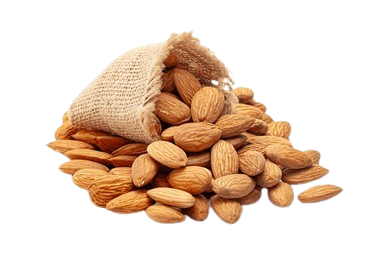The Ideal Almond Intake for Daily Health
Almonds are packed with essential nutrients. They support heart health, improve skin, and boost energy. But how many almonds per day are healthy?
The ideal almond intake ranges from 10 to 23 almonds daily. This amount provides enough nutrients without overloading calories. A small handful, about 1 ounce or 28 grams, is widely recommended.

Why Portion Control Matters
Almonds are calorie-dense. One ounce contains around 160–170 calories. Eating more than recommended can lead to weight gain. Portion control helps you enjoy benefits without negative effects.
Moreover, eating the right amount improves digestion and nutrient absorption. Your body processes healthy fats, fiber, and protein more efficiently.
Nutritional Breakdown of a Handful of Almond
One serving (28 grams) contains:
- 6g protein
- 14g fat (mostly healthy monounsaturated)
- 3.5g fiber
- 76mg calcium
- 1mg iron
- 15% of your daily Vitamin E
This mix supports your heart, bones, and immune system. Regular consumption aids in cholesterol control and reduces inflammation.
Best Time to Eat Almond Daily
You can eat almonds in the morning to kick-start metabolism. Eating them as a mid-morning or afternoon snack controls cravings. Some prefer soaking almonds overnight for better digestion and enhanced nutrient availability.
Avoid eating too many before bed, especially if you have digestive issues.
Who Should Eat Fewer Almond?
People with nut allergies must avoid almonds entirely. Those with kidney issues or taking certain medications should consult a doctor before regular intake. Also, if you’re on a calorie-restricted diet, keep intake between 8–10 almonds.
Roasted vs. Raw: Which Is Better?
Both have benefits. Raw almond retain more nutrients and are ideal for soaking. Roasted almond offer better taste but can lose some nutrients due to heat. Choose unsalted versions to avoid excess sodium.

Tips for Including Almond in Your Diet
- Add sliced almonds to oatmeal or cereal
- Use them in smoothies for protein and texture
- Mix with dried fruits for a healthy snack
- Toss into salads or use as a crunchy topping
- Enjoy almond butter on whole-grain toast
These methods provide variety and prevent boredom while maintaining health goals.
Can You Eat Almonds Every Day?
Yes, daily almond intake is safe if you stick to the suggested portion. Long-term consumption improves skin health, brain function, and supports weight management.
It’s best to integrate almond into a balanced diet. Pair them with fruits, vegetables, and lean proteins for the best results.
Conclusion: Stick to the Right Quantity
Eating 10–23 almonds a day gives your body valuable nutrients. Too few may limit benefits, too many can cause calorie overload. Find your balance and enjoy almonds as part of a healthy lifestyle.


